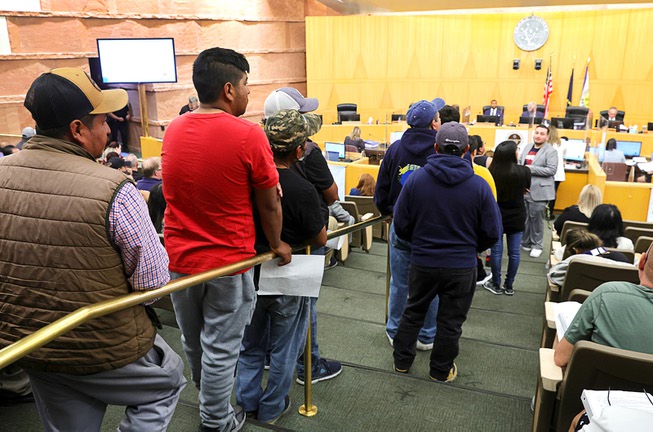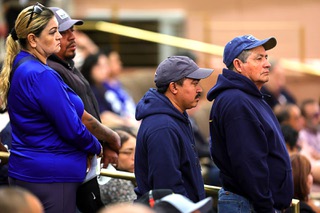
People, many of them street vendors, line up to comment on a street vendor ordinance during a Clark County meeting on a street vendor ordinance at the Clark County Government Center Tuesday, April 16, 2024.
Tuesday, April 16, 2024 | 5:56 p.m.
Street vendors in Clark County will be required to keep their distance from many communal areas like community centers and malls, according to a regulation unanimously approved Tuesday by the Clark County Commission.
After more than three hours of presentations, debate and public comment, commissioners went forward with a county plan to regulate the industry, including requiring street vendors to obtain a business license.
The regulation will go into effect April 30.
“So, if we pass something today, we’re legalizing an industry that has never been legal in Clark County,” Commissioner Tick Segerblom said. “We’re starting a process that hopefully we can evolve.”
The county’s action is in response to the 2023 Nevada Legislature’s passage of Senate Bill 92, which directed individual jurisdictions throughout Nevada to create requirements for licensing and regulation of street vendors.
Last fall, the county approved an initial ordinance that set a 1,500-foot distance requirement for street vendors at event venues holding more than 20,000 people, such as T-Mobile Arena and Allegiant Stadium.
The new regulation adds restrictions, prohibiting vendors from selling within 500 feet of a pedestrian mall or entertainment district. Vendors also aren’t allowed to sell near community centers unless contracted by the county, or “the extreme outside perimeter” of any school property or child care facility.
The new rules also call for street vendors to have a business license, permits from the Southern Nevada Health District and the Nevada Department of Taxation, and proof of liability insurance. They would also have to detail to the county the products they are selling and structure they are selling from.
The liability insurance requirement could put many vendors, some of whom are immigrants with limited means, out of business, advocates say.
The proposal additionally calls for street vendors to not operate within 150 feet of another vendor, licensed food establishment during its business hours, a business with a nonrestricted gaming license, an emergency response vehicle entrance path or a sidewalk or street closure.
In addition, vendors would be barred from selling within 15 feet of an intersection, loading zone, parking space, access ramp designed for people with disabilities, public restroom, bus stop, driveway, alleyway, crosswalk, building entrance or exit, fire escape, emergency exit, fire hydrant, fire lane or fire department connection.
The county’s new bill adds limitations on the hours of operation as well, allowing street vendors to sell between 8 a.m. and 9 p.m. unless they are contracted by another business or individual.
Violators may be charged with a civil penalty carrying a fine up to $500. If a vendor violates the ordinance while outside a residential zone, they could be charged with a misdemeanor and subject to up to six months in county jail.
Since being introduced last month, the street vending ordinance has received pushback from the vendor community and its allies, specifically toward what many have called arbitrary distance requirements.
Carmen Parra, a member of the advocacy group Make the Road Nevada, told the Sun last week that many vendors she’s spoken with didn’t know about the original regulations passed in October 2023. Make the Road Nevada has taken the lead in backing street vendors since the 2023 Nevada Legislature passed Senate Bill 92 requiring licensing for vendors be handled by individual jurisdictions.
Nevada Sen. Fabian Doñate, D-Las Vegas, who sponsored the bill, asked county commissioners Tuesday to revisit some of the rules in the proposed ordinance. He said street vending “is a cross-cultural issue that will impact all of us,” but if the ordinance was passed as is, it would be “devastating” to families.
“Our legislation was crafted to empower and protect the dignity of our sidewalk vendors and provide them a legitimate pathway for entrepreneurship and economic mobility,” Doñate said. “Evidently, what we need to focus on is as we prepare to vote on this ordinance today, it’s imperative for the commissioners to pass an ordinance that reflects the needs of our community — and that current draft falls short of that request.”
Alongside Doñate, many people filled the commission chambers to support the vendors, requesting the item be tabled for further discussion with the sidewalk vendor community.
Eduardo Moreno, who has been a street vendor the past 10 years, told the commission the industry was his lone way to support his four children.
The man said he sells products like mango, shaved ice or elote from around 7 a.m. to 7 p.m. near Boulder Highway but has been assaulted and robbed multiple times in his years in business. He makes about $60 to $80 a day with inflation costs where he once made $180 daily, he said.
He opposed the 500-foot restriction from parks, schools and churches specifically.
“I know the rest of the regulations may be difficult for many of us, but we agree that we can follow,” Moreno said Tuesday. “I would ask if you could please remove the restrictions from parks and schools.”
Other audience members urged commissioners to approve the regulation, saying street vendors posed a threat to their small businesses.
Todd Kelly, chief operating officer of the DRG Food Group, which operates fast food restaurants like Taco Bell and Arby’s, said it was “awesome” that people were trying to make a living as street vendors, but he wanted a larger distance requirement between them and restaurants. He and many others from the fast-food industry, including some store managers who said they grew up in a family of immigrants and street vendors, urged the board to increase the distance requirement from 150 feet to 500 feet.
Jurisdictions in Nevada have until July to pass regulation in accordance with the state law. It allows local boards and city councils to establish regulations on the time, place and manner street vendors can sell so long as “the requirements are objectively and directly related to the health, safety or welfare concerns of the public.”
The city of Las Vegas’ recommending committee on Monday voted to wait 60 days before voting to send a proposal to the city council for consideration.
“It’s a bittersweet moment for me,” said Doñate in a press event with Battle Born Progress later this afternoon. “While on one hand we finally have a legalized pathway for these vendors to operate, which we’ve waited for so long — three years in the process finally taking shape — a part of me feels like we did fall short somehow.”
[email protected] / 702-948-7854 / @gracedarocha

